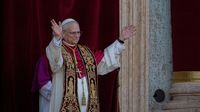Groups supporting survivors of clergy sexual abuse have expressed outrage over the election of Pope Leo XIV, formerly Cardinal Robert Prevost, citing his past handling of molestation cases and describing his elevation as a grave insult. Prevost, 69, who became the first-ever US-born pontiff after a short conclave at the Vatican on Thursday, May 8, 2025, had previously faced scrutiny for decisions made during his tenure as head of the Augustinian order in Chicago and later as bishop in Peru.
As The Guardian reported, while leading the Augustinians in Chicago, Prevost faced allegations against Richard McGrath, an Augustinian priest and principal of Providence Catholic High School, accused of molesting a student and possessing child abuse imagery. Despite these allegations, McGrath remained in his post. Though McGrath retired in 2017, the order only expelled him in December 2023—a move first revealed days before the conclave. The student, Robert Krankvich, later sued and received a $2 million settlement. Krankvich died in April this year. His father told the Chicago Sun-Times, “Money doesn’t bring happiness. It gave him no closure.”
Another priest with previous abuse accusations, James Ray, was permitted to live in an Augustinian friary next to an elementary school under Prevost’s watch. The Vatican has maintained that Prevost did not authorise Ray’s placement.
Later, during Prevost’s tenure as bishop of Chiclayo, Peru, three women accused two priests—Eleuterio Vásquez González and Ricardo Yesquén—of sexually abusing them as minors. The women say they informed Prevost directly but told The Guardian that no meaningful investigation followed. One of the accusers, Ana María Quispe, told Cuarto Poder: “They have always told us the church is our mother – but a mother protects.”
According to The Guardian, the diocese said the Vatican’s investigative body found “insufficient evidence” to act, and Peruvian authorities cited expired statutes of limitation. Survivor advocacy groups have condemned Prevost’s election. The Survivors Network of those Abused by Priests (SNAP) filed a formal complaint in March under church laws introduced by the late Pope Francis, alleging Prevost failed to act properly in abuse cases. After his election, SNAP issued a statement expressing “grave concern about his record managing abuse cases.” It added: “You can end the abuse crisis. The only question is: will you?”
The Survivors of Childhood Sex Abuse (SCSA) were more direct, calling the election “an insult.” In their statement, they said: “The Catholic hierarchy has not merely mishandled abuse allegations – it industrialised the process. Pope Leo XIV … was in the rooms for all of it.” Boston attorney Mitchell Garabedian, who represented victims in the case that inspired the Oscar-winning film Spotlight, said: “The Catholic church has to understand that the safety of innocent children cannot be sacrificed for an outdated and inexcusable need to protect the reputation of the Catholic church.”
The Vatican’s press office did not respond to The Guardian‘s request for comment. It has generally maintained that Prevost followed canonical procedures and has not been accused of abuse himself.
Prevost’s rise to the papacy was partly attributed to his reputation as a moderating figure within the church hierarchy. He was elevated to cardinal by Pope Francis in 2023 and served as prefect of the Vatican’s powerful Dicastery for Bishops before being elected pope.
The bells of St. Peter’s Basilica rang and white smoke rose from the chimney on top of the Sistine Chapel on Thursday afternoon, a sign that a new pope had been chosen by the cardinals. Cardinal Robert Prevost has become the first American ever to be elected pope in the 2,000-year history of the Catholic Church. He is a former missionary who worked in Peru and now leads the Vatican’s powerful department that oversees bishops.
A senior cardinal deacon announced that the new pope has chosen the name Leo XIV. Pope Leo XIV, 69, is from Chicago and is known as a skilled diplomat within the Church. He took over after the death of Pope Francis in April and became the new spiritual leader for Catholics around the world. His appointment has sparked interest not only in his faith and leadership but also in his financial situation. However, money is not what motivates a pope.
Like Pope Francis, Leo XIV prefers to live simply and humbly. Do popes receive a salary? The pope does not earn a regular paycheck. Instead, the Vatican takes care of all his basic needs—such as housing, food and transportation—through special allowances, according to reports from Fox News and the Associated Press.
What kind of assets does a pope have access to? The pope has access to various resources connected to his position. This includes transportation, like cars, and other privileges that come with being the head of the Church. What is Pope Leo XIV’s net worth? It’s not known how much Pope Leo XIV (Robert Prevost) is currently worth. However, when he was a cardinal, it’s reported he earned between 4,000 and 5,000 euros each month, according to Merca20. How much will Pope Leo XIV earn now? The pope does not receive a salary like cardinals do. Since the Vatican covers everything he needs—from food and clothing to medical care—Leo XIV won’t be paid for his new role as pope.
Born in Chicago in 1955, Robert Francis Prevost joined the Order of St. Augustine in 1977, became a priest in 1982, and earned a doctorate in Canon Law in Rome. He also studied mathematical sciences at Villanova University.
In the frenzied days leading up to the papal conclave following Pope Francis’s passing on April 21, speculation was rampant: would the next pope be from Africa, perhaps the first Black Pope in modern history? Or would Latin America once again lead the Church? Papal predictions are famously unreliable, and once again, the white smoke proved the pundits wrong. Instead of an African or Asian cardinal, the Church chose a relatively unknown Augustinian from Chicago with deep missionary roots in Peru.
When Cardinal Robert Francis Prevost stepped onto the loggia overlooking St. Peter’s Square as Pope Leo XIV, he immediately set a different tone, speaking not in English, his native tongue, but in Spanish and Italian. This wasn’t just a linguistic flourish. It was a statement. Fluent in English, Spanish, Italian, French, and Portuguese—and proficient in Latin and German—Leo XIV is among the most linguistically adept popes in Church history. Yet his decision to forgo English in his first appearance spoke volumes: a signal of solidarity with Latin America and a style rooted more in communion than communication.
Born in 1955 to a French-Italian father and Spanish-American mother, Robert Francis Prevost grew up in Chicago’s multicultural neighbourhoods. He is the first pope from the US, and the second from the Americas—after Pope Francis of Argentina—a milestone for a Church that has grown rapidly in the Western Hemisphere.
After studying mathematics and philosophy at Villanova University, he entered the Augustinian order in 1977 and later earned a doctorate in Canon Law from the Pontifical University of Saint Thomas Aquinas in Rome. Ordained in 1982, he was soon sent to Peru, where he lived out a mission rather than a career. In Trujillo, he became not just a priest but a builder of communities. For over a decade, he led formation for Augustinian candidates, served as judicial vicar, taught theology, and ministered in poor and neglected neighborhoods. That immersion gave him a distinctly missionary spirituality—grounded in humility, solidarity, and proximity.
He was later called back to leadership: first as Provincial of the Augustinians in Chicago, then as Prior General of the global order—elected to a rare second term. Pope Francis took notice. In 2014, Prevost was appointed Apostolic Administrator of Chiclayo and soon became its bishop. By 2023, he led the powerful Dicastery for Bishops in Rome.
In 2012, Robert Francis Prevost voiced concern over Western media normalising practices at odds with the Gospel, including same-sex relationships. Leo XIV is younger than his two predecessors at their elections, Francis at 76 and Benedict XVI at 78. John Paul II visited India twice, once in 1986, then again in 1999. As Prior General of the Augustinians, Robert Francis Prevost visited Kochi in 2004 and again in 2006.


